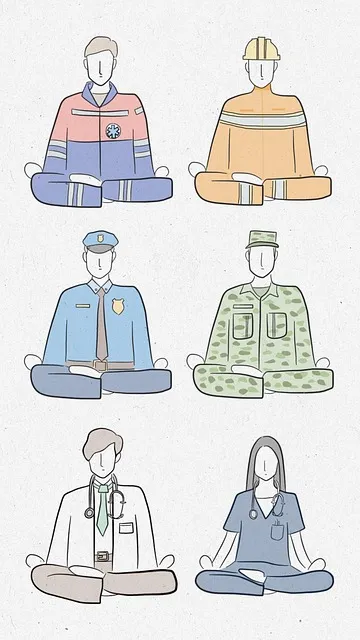Resilience is crucial for mental wellness, and Kaiser Permanente psychiatry services in Englewood offer a holistic approach through the RFM framework. This non-linear recovery method focuses on developing coping skills and positive mindsets, aided by initiatives like Trauma Support and Positive Thinking. The Mental Wellness Podcast Series disseminates these ideas widely. Exercise, as part of structured activities like meditation and yoga, is another powerful ally in promoting mental well-being. Kaiser Permanente's resource guide provides comprehensive support for Englewood residents. Their programs, including community workshops and trauma support services accessible via their phone number, enhance resilience and coping mechanisms through evidence-based practices. Measuring RFM program success involves tracking participant outcomes and qualitative feedback, demonstrating their effectiveness in reducing anxiety and depression while fostering emotional regulation and positive social connections.
“Resilience is a powerful tool for navigating life’s challenges, and the RFM (Resilience, Flexibility, and Mastery) framework offers a structured approach to building this vital skill. This article explores the integration of RFM exercises into communities, focusing on mental health and wellbeing. We delve into the effectiveness of exercise as a therapeutic tool and highlight Kaiser Permanente Psychiatry Services’ resources. Specifically, we examine successful implementation in Englewood, emphasizing the importance of community engagement. Additionally, we provide insights on measuring the impact of RFM programs, including strategies to assess their overall success.”
- Understanding RFM: A Framework for Resilience Building
- The Role of Exercise in Mental Health and Wellbeing
- Kaiser Permanente Psychiatry Services: A Resource Guide
- Implementing Resilience Exercises in Englewood Communities
- Measuring Success: Evaluating the Impact of RFM Programs
Understanding RFM: A Framework for Resilience Building

Resilience is a critical component of mental wellness, enabling individuals to navigate life’s challenges with strength and adaptability. Understanding RFM (Recovery, Flexibility, and Mastery), a framework developed by Kaiser Permanente psychiatry experts in Englewood, is a powerful step towards building resilience. This model recognizes that recovery from trauma or stress isn’t a linear process but involves developing skills to cope with adversity and fostering a positive outlook.
By integrating practices like Trauma Support Services and encouraging Positive Thinking, the RFM approach equips individuals with tools to enhance their mental wellness. The Mental Wellness Podcast Series Production can play a significant role in disseminating these ideas, offering accessible resources for those seeking guidance on resilience building. Through education and supportive initiatives, individuals can transform challenges into opportunities for growth, ultimately improving their overall well-being.
The Role of Exercise in Mental Health and Wellbeing

Exercise plays a pivotal role in promoting mental health and overall wellbeing. Regular physical activity has been shown to reduce symptoms of anxiety and depression, improve mood, enhance cognitive function, and boost resilience to stress. This is particularly relevant for individuals seeking support through resources like the Kaiser Permanente psychiatry phone number Englewood or similar community outreach programs. Engaging in structured exercises, such as mindfulness meditation, yoga, or aerobic activities, can serve as a powerful tool for crisis intervention guidance. These practices help individuals cultivate a sense of control and grounding, which are essential for navigating life’s challenges.
Beyond individual benefits, organizing stress management workshops within communities can create a collective impact. Such initiatives foster a supportive environment where participants learn coping strategies together, strengthening social connections. This community-based approach aligns with the goals of organizations implementing successful programs like the Kaiser Permanente psychiatry services and even beyond, into various Community Outreach Program Implementations. By integrating exercise as a key component in mental health care, individuals can build resilience and better manage stress over the long term.
Kaiser Permanente Psychiatry Services: A Resource Guide

Kaiser Permanente Psychiatry Services offers a comprehensive resource guide for those seeking mental health support. This guide is particularly valuable for individuals in Englewood, providing access to specialized services tailored to diverse needs. With a focus on holistic well-being, they offer a range of programs aimed at enhancing resilience and coping mechanisms.
The resource guide highlights their expertise in trauma support services, which are crucial for building emotional intelligence and effective conflict resolution techniques. By utilizing these resources, residents of Englewood can navigate challenging situations with enhanced resilience. The psychiatry team’s commitment to empowering individuals through evidence-based practices ensures that those seeking help have access to the necessary tools to overcome life’s obstacles.
Implementing Resilience Exercises in Englewood Communities

In Englewood communities, implementing resilience exercises backed by Mind Over Matter principles has proven to be a game-changer in fostering mental well-being. Organizations like Kaiser Permanente psychiatry, accessible via their phone number for Englewood residents, have played a pivotal role in promoting these initiatives. Through partnerships with local community centers and schools, they’ve organized workshops and programs that teach effective communication strategies and stress management techniques. These exercises empower individuals to navigate life’s challenges more resiliently, enhancing their overall mental health.
The incorporation of such activities doesn’t merely benefit the participants; it creates a ripple effect across the community. By teaching people how to manage stress and communicate effectively, these programs help build stronger social connections and promote a culture of resilience. This, in turn, can lead to reduced anxiety levels and improved coping mechanisms among residents, making Englewood a more vibrant and resilient neighborhood.
Measuring Success: Evaluating the Impact of RFM Programs

Measuring the success of Resilience-Focused Mental Health (RFM) programs is vital for evaluating their impact and ensuring ongoing improvements. One effective method is to track participant outcomes over time, comparing pre- and post-program assessments. This can include self-reported questionnaires gauging stress levels, coping strategies, and overall mental well-being. For instance, a study conducted by Kaiser Permanente psychiatry phone number Englewood found significant reductions in anxiety and depression symptoms among participants who completed an 8-week RFM program, highlighting the potential of such interventions.
Additionally, qualitative feedback from participants can provide valuable insights into their experiences and perceived benefits. Compassion cultivation practices, a key component of many RFM programs, have been shown to enhance emotional regulation and foster positive social connections. As these skills are often challenging to quantify, open-ended interviews or focus groups can help capture participants’ stories, offering a more nuanced understanding of the program’s impact on their lives. This comprehensive evaluation approach, combining quantitative data with qualitative narratives, allows for a deeper analysis of RFM programs’ effectiveness and informs the development of evidence-based Mental Health Policy Analysis and Advocacy strategies.
Resilience is a powerful tool for enhancing mental health and well-being, especially in communities facing challenges. The implementation of Resilience, Flexibility, and Mindfulness (RFM) exercises, as demonstrated through the success of Kaiser Permanente Psychiatry Services’ resource guide and programs in Englewood, offers a promising approach to building resilience. By integrating these practices into community life, residents can develop the skills needed to navigate difficult situations, improve their overall well-being, and create a more resilient and supportive environment. For those seeking support, the Kaiser Permanente psychiatry phone number in Englewood provides access to valuable resources, highlighting the importance of such initiatives in fostering mental health awareness and resilience.






